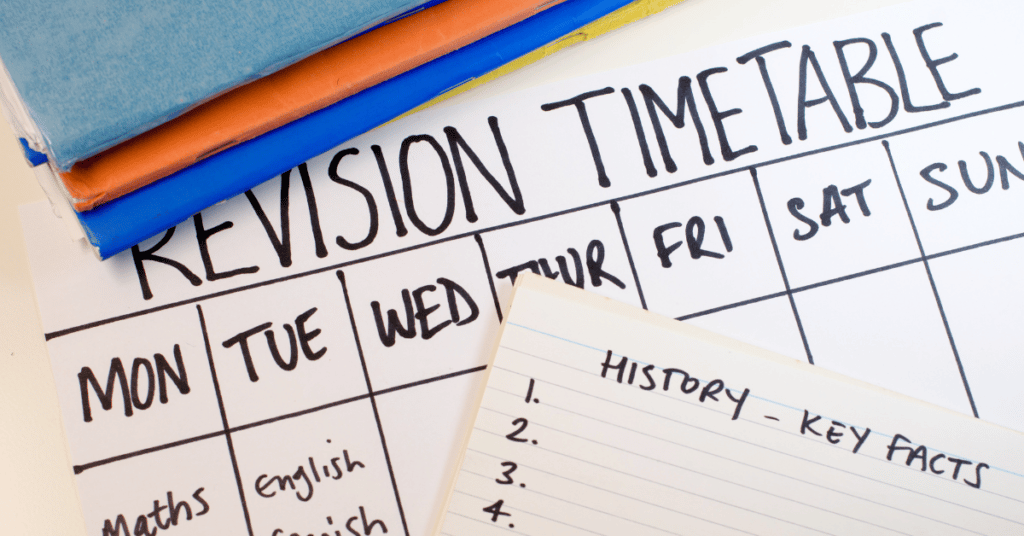We all know that setting and achieving one’s study goals are an instrumental part of any exam preparation.
I have outlined some easily attainable study goals if you follow the methods that are prescribed.
#1 Prepare in advance
The main criteria for achieving one’s study goals is Time Allocation.
As we all know, ‘time and tide waits for no man.’ And procrastination is one of the worst habits to succumb to.
Advance preparation means that you have a vision.
Imagine the study goals you want to achieve. Then work backward to a time when you should begin your preparation.
If your goal is your O or A level examinations, set yourself at least one to one and a half years before the exams.
Plan a study routine and work out the time for the subjects you are taking.

#2 Set a timetable to allocate revision time for all subjects
Devising a timetable is a key feature for revision on all your subjects.
You will need to be practical about this and set aside enough time to revise all the work you have done in school so setting smart study goals are important.
Remember that if you are starting your revision in Secondary 3, you will have more time but you will still have to finish the Secondary 4 syllabi.
That means you will be revising and learning at the same time. This is a good method.
It stops you from cramming everything at the last moment. And the best part is that it gives you some confidence.
How do you concoct such a timetable?
My advice is that you start with the weaker subjects and set aside the same number of hours every day. It will give you a solid area to work on.
Even 2-3 hours a day can be effective if you cover the required work. It is not the time but the quality.
Try to do a recall the next day and if you are able to do so, the time has been effectively spent.
#3 Engaging the right tutor/s to help you in your weak areas
Many parents look for a tutor at the last minute. This may be slightly risky but students sign on for a few last-minute tips.
A word of advice about this. If you have weak areas in that subject, engaging last-minute help is not going to be helpful.
It’s just money going down the drain. The best time to engage a tutor would be at the start of the academic year, well in advance of your exams, or the year before your O levels. He/ she can also guide you in planning your study goals.
Do a little homework for your tutor. Scout around for someone who does not teach large groups. That can be distracting for you.
Some groups go on to 20 or more. You will need a group size small enough for the tutor to have ‘eyes’ on you.
After all, that is the main purpose of signing up, isn’t it? You need some personalised guidance.
And oh, make sure that the tutor is devoted. A devoted tutor lets the lesson run on after the stipulated time. This means they are not watching the clock.

Such tutors genuinely want to help you to overcome your weak areas. They are interested in weeding out your mistakes and do not mind sacrificing their time to do this.
Actually, they will feel that it is part and parcel of their job. These tutors are rare so if you do get to hear about them, snap them up, please!
A good tutor should be able to take you through your difficulties with ease. In fact, you should notice some improvement in a few weeks and are able to achieve your study goals.
So, if you are contemplating some guidance, engage the right one or repent at leisure!
Ok, I was just exaggerating a little. The only thing you will repent will be a poor showing in your exams.
Getting some tutorial help and ensuring that you are on top of your grades is your duty. Make sure that you take the right steps soon.
#4 Daily revision
This is the holy grail of all examination-bound students. Daily revision should be a part of your routine. This may sound absolutely old-fashioned, but it works so make sure you set those study goals!
What do you do during revision?
Revision is about recalling what you have read and studied. No one has a perfect memory and it needs a little sprucing up. That is the main purpose of revision.
Start slow and work your way up from an hour a day to a few more. Revision is the cornerstone of all successful students’ routines.
Find a quiet corner and revise alone. Yes, alone. Self-study helps you to be more efficient and independent. That is my advice.
However, if you have cooperative study friends, study in a group by all means.
#5 Note-taking
Whilst revising, take down notes either in e-notes or written form. The method is not really important.
The notes should help you to recall easily without any doubts. Paper note-taking is the closest to exam conditions.
You will also be forced to learn spelling without the online spell and grammar check that is so easily available.
Sometimes, the old-fashioned way works best. These are my own personal methods on setting and achieving study goals. I’m sure they will work very well for you too!
Just start today! Procrastination is the greatest stumbling block for students.
There is no time like the present, so get down to these tips in achieving your study goals easily. And, the very best of luck!
